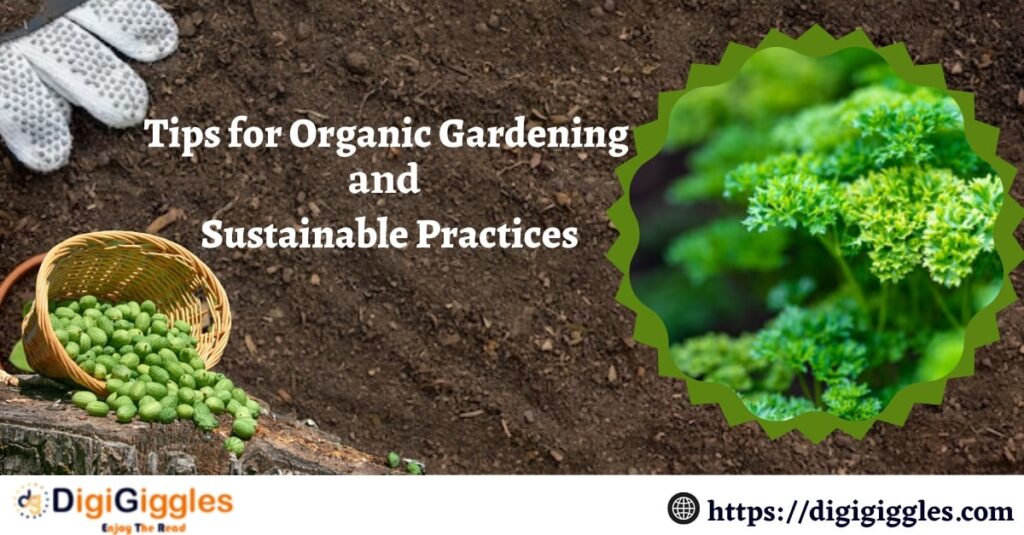Introduction
Welcome to our guide on tips for organic gardening and sustainable practices! In an era where environmental consciousness is paramount, more and more people are embracing organic gardening as a way to grow plants naturally and sustainably. By adopting these practices we can cultivate thriving gardens while minimizing our impact on the planet. In this blog, we will provide you with valuable insights and practical tips to help you embark on your organic gardening journey and incorporate sustainable methods into your gardening routine. Whether you’re a beginner or an experienced gardener looking to deepen your understanding, we have something for everyone.
What is Organic Gardening?
Organic gardening refers to the practice of growing plants and cultivating a garden using natural methods and materials without the use of synthetic pesticides, herbicides, or chemical fertilizers. It is an environmentally friendly approach that focuses on working in harmony with nature promoting soil health, biodiversity, and sustainable practices. In organic gardening, the emphasis is placed on nourishing the soil through the use of organic matter, compost, and natural amendments to provide plants with the necessary nutrients. Instead of relying on chemical fertilizers, organic gardeners rely on compost, animal manure, cover crops, and other organic sources to improve soil fertility and structure.
Pest and disease control in organic gardening is approached through integrated pest management (IPM) which involves using a combination of techniques such as companion planting, attracting beneficial insects, crop rotation, and organic pest control products when necessary. The goal is to maintain a balance in the garden ecosystem and minimize the use of synthetic chemicals. It also encourages biodiversity by incorporating native plants, creating habitats for beneficial insects and wildlife, and avoiding the use of genetically modified organisms (GMOs). It promotes sustainable water management practices such as rainwater harvesting, mulching, and efficient irrigation methods to conserve water resources.
What are Sustainable Practices?
Sustainable practices refer to actions and methods that promote the long-term well-being of the environment, society, and economy. These practices aim to meet present needs without compromising the ability of future generations to meet their own needs. In the context of gardening, sustainable practices focus on minimizing negative environmental impacts, conserving resources, and promoting ecological balance. Here are some examples of sustainable practices in gardening:
- Conservation of water
- Soil health management
- Organic pest and disease control
- Biodiversity preservation
- Proper waste management
- Energy efficiency
- Responsible resource use
- Sustainable seed and plant choices
Tips for organic gardening and sustainable practices
In today’s world where environmental concerns are becoming increasingly important, organic gardening and sustainable practices have gained significant popularity. By adopting these methods we can grow healthy, chemical-free plants while minimizing our impact on the environment. Here is how:
Start with healthy soil: The foundation of successful organic gardening lies in nurturing healthy soil. Enhance your soil’s fertility by adding compost, aged manure, or organic matter. This enriches the soil with essential nutrients and improves its structure ensuring optimum plant growth and resilience.
Choose organic seeds and plants: Selecting organic seeds and plants is crucial for maintaining an organic garden. Look for certified organic options that have been grown without synthetic pesticides or genetically modified organisms (GMOs). These plants will be better adapted to organic gardening practices and contribute to a healthier ecosystem.
Practice crop rotation: Crop rotation is an effective technique to prevent soil depletion and minimize pest and disease issues. By rotating your crops each season you disrupt the life cycles of pests and diseases reducing their impact on your plants. Additionally rotating crops helps balance nutrient levels in the soil and improves overall plant health.
Embrace companion planting: Companion planting involves strategically growing plants together that benefit each other in various ways. For example, planting marigolds near vegetables can repel pests while legumes fix nitrogen in the soil benefiting neighboring plants. Companion planting promotes biodiversity and reduces the need for synthetic pest control.
Implement water conservation methods: Conserving water is essential for sustainable gardening. Install a rainwater harvesting system to collect and utilize rainwater for irrigation. Mulching around plants helps retain moisture, reduces weed growth, and regulates soil temperature. Drip irrigation systems deliver water directly to plant roots minimizing wastage.
Integrated pest management (IPM): Adopting an integrated pest management approach minimizes the use of harmful pesticides. Encourage beneficial insects such as ladybugs and lacewings by planting nectar-rich flowers. Use organic pest control methods like neem oil, insecticidal soaps, or homemade remedies like garlic and chili pepper sprays.
Composting: Composting kitchen scraps and yard waste reduces landfill waste and provides nutrient-rich compost for your garden. Compost improves soil structure, retains moisture, and enriches plants naturally. Avoid adding meat, dairy, or oily items to your compost pile to prevent attracting pests.
Preserve biodiversity: Encourage biodiversity in your garden by incorporating native plants which support local wildlife and pollinators. Create habitat areas like birdhouses, butterfly gardens, or small ponds to attract beneficial insects and animals. Biodiversity helps maintain a healthy ecosystem and reduces the need for chemical interventions.
Practice organic weed control: Weeds compete with your plants for resources but chemical herbicides are not the solution. Hand-pulling weeds using mulch and employing weed barriers are effective organic weed control methods. Regularly maintain your garden to prevent weed seed dispersal and keep weed populations under control.
Continuous learning and experimentation: Finally, embrace a mindset of continuous learning and experimentation. Gardening is an ongoing process and each season brings new challenges and opportunities. Stay updated with organic gardening techniques, seek advice from experienced gardeners, and don’t be afraid to try new methods to improve your gardening skills.
Conclusion
By following these tips for organic gardening and incorporating sustainable practices into your routine you can create a thriving garden while caring for the environment. Remember organic gardening is not only about the end result but also about the journey of nurturing and connecting with nature.
